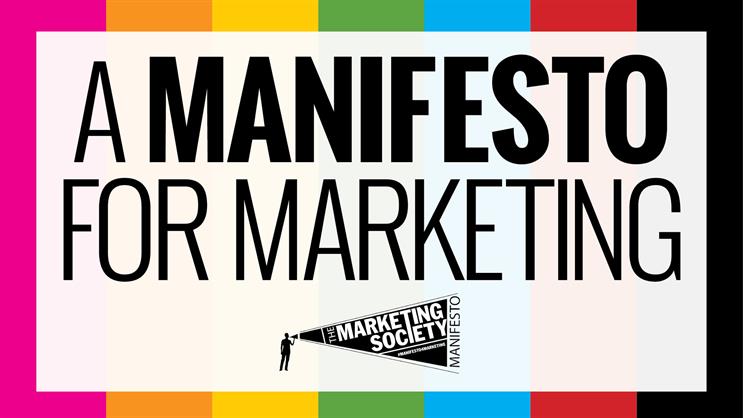There is no doubt that marketing has contributed to making our society vibrant, democratic and innovative. But there is also no doubt that, as marketers, we are going to need to change if we are to contribute powerfully in the future to the rapidly changing world around us.
Working out how much we need to change, and in what direction, is no easy task. It’s a challenge that we have been focusing on at The Marketing Society and one that has formed the foundation of our new Manifesto for Marketing.
The aim of the Manifesto is to set out a new formula to help guide marketers and marketing through the next decade. It presents a framework for marketing excellence, three key challenges to help your organisation achieve sustainable growth, and an opportunity for individual marketers to rate their own team’s performance and to compare this with other senior marketing professionals.
Before we even began to think about tackling these objectives, we started by trying to articulate what marketing really is now – what it is for – and we came up with this definition of the purpose of marketing: "To create sustainable growth by understanding, anticipating and satisfying customer need."
Sustainable growth is a powerful idea. It implies that the growth is profitable and reflects the broader needs of society and other stakeholders, so that it can be sustained for the long-term wherever it applies.
Our definition of marketing also means being sustainable in its modern sense – in balance with society and the environment.
With this definition in place, the Manifesto identifies three key challenges for marketers to address:
Pursue your purpose
Define your organisation’s purpose
An organisation’s purpose should be central, and the brand a means to that end for the business. This area needs to be owned by the whole management team, but in most multi-brand organisations there is an organisational purpose and then a brand mission, which relate to each other.
Make sustainable growth your central aim
This area is central to the purpose of marketing, but it is not always seen as the starting point for what marketing has to achieve. It needs to be, and, of all roles in a business, marketing is best-placed to make a strong contribution to this cause.
Studying the best current thinking on sustainability reminds us that resources are finite, and that costs will rise as their scarcity increases. The marketer’s job is to translate society’s need for sustainability into winning solutions for customers and the business.
Leave a positive legacy
Keep one foot in the future and one in the past. Be the guardian of this chapter of the brand and business by looking to the future while remaining mindful of the brand’s past, history, heritage and value.
Champion customers
Anticipate customer needs
Understanding customers’ spoken and unspoken needs is central to strong, successful marketing. It is also useful to bring a wider, outside-in view of the world into the organisation.
Championing the customer means reminding people across the organisation that the customer is the only source of revenue.
Protecting and growing this requires the business to think about the customer in this context.
Shape the customer experience
Marketing leadership needs to see the job of enhancing the customer experience as a constant concern. A great customer experience is at the heart of successful businesses such as Amazon and Apple.
Find creative ways to engage
Embrace new technology and the role it plays in changing customer and wider communications, bringing new sources of data and insight, and making organisations more transparent. This challenge is also about the core creativity that marketers use to connect with customers, earning their attention and engagement in fresh ways.
Mobilise the organisation
Collaborate with your peers
It is essential to take a company-wide, not just marketing-centric, view of priorities and decisions. Marketers need to be able to engage in trade-off discussions where it may be better to choose to do less in marketing and more in another part of the organisation.
This means having a broad sense of practicality and respect for getting things done in big, complicated organisations and giving credit to colleagues in other disciplines rather than claiming it all. As Ronald Reagan was fond of saying: "There is no limit to what can be achieved in politics if you are prepared to give the credit to someone else."
Bring the voice of the customer into the boardroom
Use everyday language that everyone understands – for example, describe consumers as people (less exploitative and more personal), and do not talk about brand essence and brand architecture in an abstract sense, or as ends in their own right.
We need to talk about customers, reputation, products and services, keeping our terms real and tangible.
Quantify the cost and value of your work
Create measures that the whole management team can understand and use in everyday discussion. We need to show clearly how marketing adds value, and in ways that are broad-based, not simplistic. These include important measures of the customer’s view of the business, such as business reputation, customer satisfaction and willingness to recommend.
How do you measure up to these challenges?
Members of The Marketing Society can rate their own performance against each of these three key challenges and then compare their scores with other leading marketers at
The ambition is that, armed with a Manifesto for the future, marketing will continue to play a positive role in the development of our society. And that’s a responsibility we all share.


